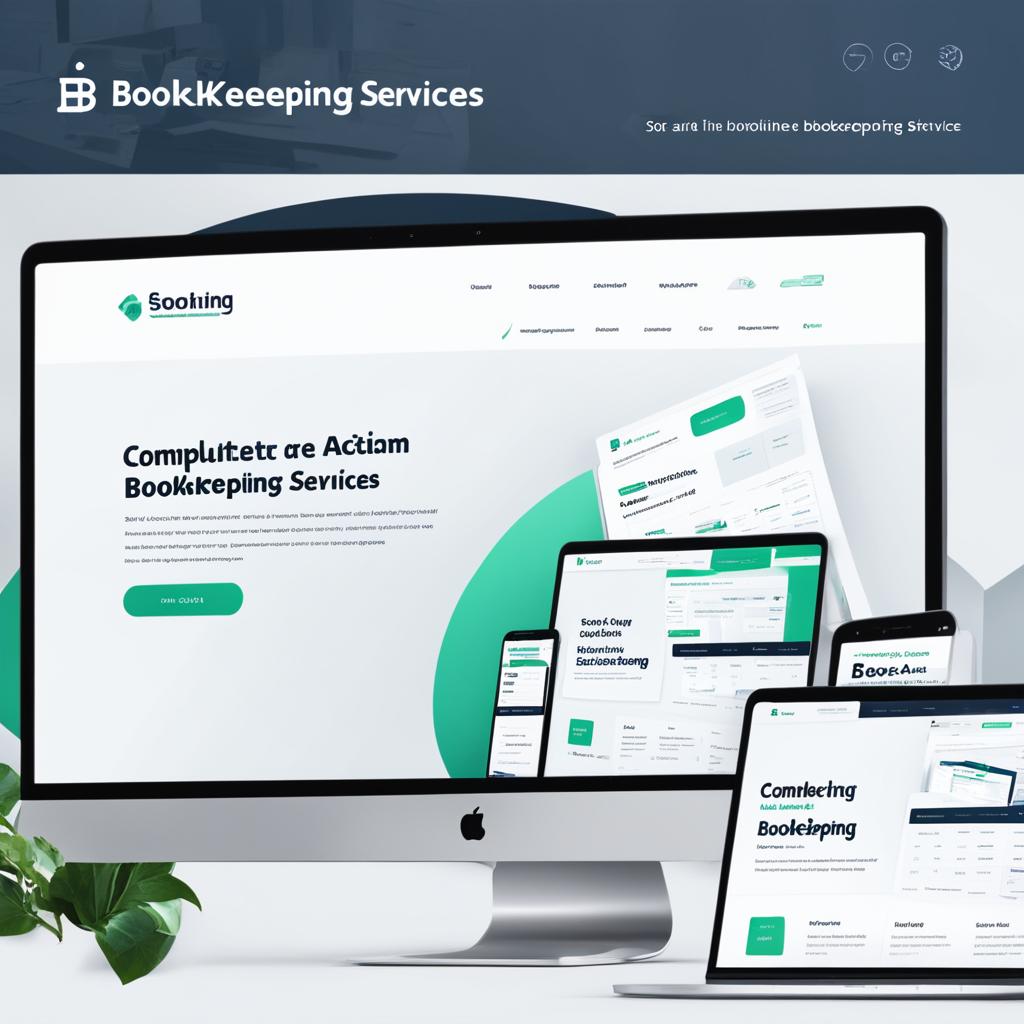Bookkeeping is a vital role in any business operation, ensuring that financials are accurately tracked and helping businesses grow. In this comprehensive guide, I will provide step-by-step instructions on how to start a bookkeeping business. From choosing your niche to pricing your services, I will cover all the essential aspects of starting a successful bookkeeping business.
Key Takeaways:
- Starting a bookkeeping business requires thorough planning and consideration of various factors.
- Choose a specific market and niche to effectively target your ideal customers.
- Write a comprehensive business plan that outlines your services, competitive advantages, and growth plans.
- Register your business and obtain the necessary insurance coverage to protect yourself and your clients.
- Select the right bookkeeping software to streamline your processes and enhance your professionalism.
What Does a Bookkeeper Do?
A bookkeeper plays a crucial role in managing and organizing a company’s finances, ensuring accurate financial records and providing valuable insights into financial health. They handle various tasks related to financial transactions, accounts payable and receivable, and the generation of essential financial statements.
“A bookkeeper is the backbone of a business’s financial operations, responsible for maintaining accurate records and helping business owners understand their cash flow.”
Bookkeepers are primarily responsible for recording financial transactions, such as sales, purchases, and expenses, into the company’s books. They ensure that each transaction is properly categorized and recorded in the company’s accounting system.
Furthermore, bookkeepers manage accounts payable and accounts receivable, keeping track of money owed to suppliers and money owed by customers. They ensure that invoices are issued promptly and that payments are received and recorded accurately.
Bookkeepers also generate financial statements, such as balance sheets and income statements, which provide a snapshot of the company’s financial position and performance. These statements are essential for monitoring the company’s profitability, liquidity, and overall financial health.
While bookkeepers are not required to have an accounting degree or certifications, their role is critical in helping business owners make informed financial decisions. By effectively managing finances and providing accurate financial information, bookkeepers contribute to the success and growth of a business.
Bookkeeper Responsibilities:
- Recording and categorizing financial transactions
- Managing accounts payable and accounts receivable
- Generating financial statements
- Monitoring cash flow
- Reconciling bank statements
- Assisting with budgeting and financial planning
- Preparing tax documentation for accountants
- Advising business owners on financial matters
Bookkeeper’s Impact:
Bookkeepers play a crucial role in managing a company’s finances, ensuring accuracy, and providing financial insights. They are the key resource for maintaining organized financial records and helping business owners make informed decisions based on their company’s financial position.
How to Start a Bookkeeping Business
Starting a bookkeeping business involves several crucial steps. First, you need to determine your target market and choose a niche. Then, you should write a comprehensive business plan and decide on a catchy business name. Registering your business and getting the necessary insurance coverage are essential steps for making your business official. Choosing the right bookkeeping software, setting up your business infrastructure, pricing your services, and finding customers are also critical aspects of starting a successful bookkeeping business.
Pick Your Market and Niche
Before diving into the bookkeeping business, it’s essential to identify your market and choose a niche. Research different industries and analyze their bookkeeping needs. By specializing in a specific sector, such as retail or healthcare, you can provide targeted services and become the go-to expert in that field. This approach also helps you tailor your marketing efforts to attract clients in your chosen market.
Write a Business Plan
A well-thought-out business plan serves as a roadmap for your bookkeeping venture. It outlines your goals, target market, services, pricing strategies, and marketing strategies. Your plan should also include a competitive analysis to understand your competitors and their pricing. This analysis will help you position your business effectively within the market and differentiate yourself from the competition.
Choose a Business Name and Register Your Business
Choosing an attention-grabbing business name is essential for establishing your brand identity. Make sure your name reflects your services and is easy to remember. Once you’ve decided on a name, register your business with the appropriate authorities. This step ensures your business is legitimate and brings you one step closer to serving clients.
Obtain Insurance Coverage
Protecting your business with the right insurance coverage is crucial. Professional liability insurance safeguards you against claims arising from errors or omissions in your bookkeeping services. General liability insurance covers accidents or damages that could occur on your premises. Research different insurance options and discuss them with a reputable insurance provider to find the best coverage for your business.
Choose Bookkeeping Software
Investing in reliable bookkeeping software is vital for efficiently managing your clients’ financial records. Popular options include QuickBooks Online, Xero, and FreshBooks. Compare their features, pricing, and user-friendly interfaces to find the software that suits your business needs. Consider factors such as scalability, integration capabilities, and customer support when making your decision.
Set Up Your Business Infrastructure
To establish a solid foundation for your bookkeeping business, you’ll need to set up your business infrastructure. This includes creating a professional website to showcase your services and attract potential clients. Implement client database management tools to efficiently organize and track client information. Consider using file-sharing platforms for convenient document exchange with clients. Additionally, open a dedicated business bank account to separate your personal and business finances.
Price Your Services
Determining the right pricing for your bookkeeping services is crucial for attracting clients and ensuring profitability. Research competitors’ pricing to gain insights into the local market rates. Consider factors such as your qualifications, experience, and the scope of services you offer. You may choose to charge an hourly rate or provide package options based on the needs of your clients. Remember to strike a balance between remaining competitive and valuing your expertise.
Find Customers
Once your bookkeeping business is up and running, it’s time to find your first clients. Leverage your network by reaching out to friends, family, and acquaintances who may need bookkeeping services or know someone who does. Utilize online platforms and directories to increase your online presence and visibility. Consider offering promotional discounts for new clients or referral incentives to encourage word-of-mouth recommendations. Networking events and local business organizations can also be valuable sources for finding potential customers.
| Step | Description |
|---|---|
| Pick Your Market and Niche | Research different industries and choose a specific market to specialize in. |
| Write a Business Plan | Create a comprehensive plan outlining your goals, target market, and pricing strategies. |
| Choose a Business Name and Register Your Business | Select a catchy business name and register it with the appropriate authorities. |
| Obtain Insurance Coverage | Protect your business with professional liability and general liability insurance. |
| Choose Bookkeeping Software | Invest in reliable bookkeeping software like QuickBooks Online or Xero. |
| Set Up Your Business Infrastructure | Create a professional website, implement client database management tools, and open a dedicated business bank account. |
| Price Your Services | Determine competitive pricing based on your qualifications and services offered. |
| Find Customers | Utilize your network, online platforms, and local business organizations to attract clients. |
Pick Your Market and Niche
To effectively market your bookkeeping business and stand out from the competition, it’s beneficial to choose a specific market and niche. By conducting market research, you can identify existing bookkeeping businesses and the industries they serve. This information will help you select a target audience, allowing you to focus your marketing efforts and build credibility within a specific industry.
Conduct Market Research
- Identify existing bookkeeping businesses in your area.
- Explore the industries they serve and their specialization.
- Analyze their marketing strategies and target audience.
Market research provides valuable insights into the demand for bookkeeping services within different industries and helps you identify gaps or opportunities to target untapped markets.
Select Your Target Audience
- Define the specific type of client you want to serve.
- Consider industries that align with your expertise and interests.
- Evaluate the size and growth potential of each target market.
By selecting a target audience, you can tailor your marketing messages, services, and pricing to meet their unique needs. This specialization allows you to position yourself as an expert in serving that particular industry, making it more likely for potential clients to choose your services over generic bookkeeping offerings.
Build Industry Credibility
- Develop industry-specific knowledge and expertise.
- Stay up to date with industry trends and regulations.
- Join industry associations and attend relevant events.
Building credibility within a specific industry demonstrates your deep understanding of its unique challenges and financial requirements. It also positions you as a trusted advisor and allows you to establish long-term partnerships with clients in that industry.
Market research is critical for identifying your target audience and specializing in a specific industry.
By choosing a specific market and niche, you can differentiate your bookkeeping business and attract clients who value your expertise. Market research, target audience selection, and specialization within an industry are keys to positioning yourself as a trusted bookkeeping partner.
Write a Business Plan
A business plan is a crucial document that outlines the roadmap for your bookkeeping business’s success. It serves as a blueprint for your services, market analysis, competitive advantages, and growth plans. When creating your business plan, pay close attention to key factors such as your services, market analysis, competitive advantage, business name, and certification options. Crafting a well-thought-out business plan will not only guide your business decisions but also demonstrate your professionalism and commitment to potential clients.
Services
In your business plan, clearly define the bookkeeping services you will offer. Detail the specific tasks and responsibilities you will handle for your clients, such as transaction recording, accounts payable and receivable management, financial statement generation, and financial analysis. Be sure to highlight any specialized services or industry-specific expertise you bring to the table.
Market Analysis
Conduct a thorough market analysis to understand your target market and competition. Identify the demand for bookkeeping services in your area and evaluate the existing bookkeeping businesses. Analyze their strengths and weaknesses to identify opportunities for differentiation and competitive advantage. Use this research to assess your potential market share and develop strategies to attract and retain clients.
Competitive Advantage
Identify your competitive advantage and unique selling proposition in the market. Determine what sets your bookkeeping services apart from competitors. This could be your industry specialization, technology expertise, exceptional customer service, or any other distinctive aspect of your business. Clearly communicate your competitive advantage in your business plan to attract potential clients who will benefit from your specialized skills and expertise.
Business Name
Choose a catchy and memorable business name that aligns with your brand image. The business name should reflect your professionalism and expertise in the bookkeeping industry. Consider the target market and the image you want to convey when selecting a business name. Ensure that the chosen name is available for registration and does not infringe upon any trademarks or existing businesses.
Certification
Consider pursuing certification to enhance your professional status and credibility in the bookkeeping industry. Certifications such as Certified Public Bookkeeper (CPB) or industry-specific certifications demonstrate your knowledge and expertise. Research the available certifications and evaluate their relevance to your target market. Mention your intentions to pursue certifications in your business plan, highlighting the value they bring to your clients and your commitment to continuous professional development.
| Key Components | Details |
|---|---|
| Services | Clearly define the bookkeeping services you offer, including specific tasks and responsibilities. |
| Market Analysis | Conduct thorough research on your target market and competition to identify opportunities for growth. |
| Competitive Advantage | Define your unique selling proposition and highlight what sets your business apart from competitors. |
| Business Name | Select a catchy and memorable business name that reflects your professionalism and expertise. |
| Certification | Consider pursuing certifications to enhance your professional status and differentiate yourself in the market. |
Register Your Business and Get Insured
When starting your bookkeeping business, it’s crucial to take the necessary legal steps to register your business and choose the right business entity. Research the specific requirements for business registration in your state to ensure compliance with local regulations and establish your bookkeeping business as an official entity.
“Registering your bookkeeping business is an important legal step to ensure you’re operating within the bounds of the law and protecting your business and clients.”
During the registration process, you’ll need to select a business entity that aligns with your goals and provides liability protection. Common options include sole proprietorship, partnership, limited liability company (LLC), and corporation. Each business entity has its own advantages and disadvantages, so it’s essential to carefully consider which structure suits your needs and offers the most appropriate level of liability protection.
In addition to business registration, it’s highly recommended to obtain business insurance for your bookkeeping business. Business insurance provides financial protection in the event of accidents, lawsuits, or other unforeseen circumstances. Specifically, consider professional liability insurance and general liability insurance.
“Protect yourself and your clients by securing the right insurance coverage for your bookkeeping business.”
Professional liability insurance, also known as errors and omissions (E&O) insurance, safeguards your business from claims related to professional mistakes or negligence. General liability insurance covers potential damages or injuries that occur on your business premises or as a result of your bookkeeping services.

Choose Your Bookkeeping Software
When it comes to starting a bookkeeping business, one of the most important decisions you’ll make is selecting the right bookkeeping software. As the backbone of your business, the software you choose will determine how efficiently and effectively you can manage your clients’ finances.
Two popular options among small and large businesses are QuickBooks Online and Xero. Let’s take a closer look at both:
QuickBooks Online
QuickBooks Online is a comprehensive accounting software that offers a range of features designed to streamline bookkeeping tasks. From invoicing and expense tracking to bank account reconciliation and financial reporting, QuickBooks Online provides the tools you need to efficiently manage your clients’ finances.
With its user-friendly interface and robust capabilities, QuickBooks Online is an excellent choice for bookkeepers looking for a reliable software solution. It also integrates seamlessly with other popular business tools, such as payment processors and time tracking apps, making it even more convenient for your clients.
Xero
Xero is another highly regarded accounting software that offers a wide range of features tailored specifically for small businesses. Like QuickBooks Online, Xero provides essential bookkeeping functionality, including invoicing, bank reconciliations, and financial reporting.
What sets Xero apart is its focus on collaboration and user-friendly interface. It allows you to work closely with your clients and provides them with real-time access to their financial information. Xero also offers a vast marketplace of integrations, allowing you to customize and expand the functionality of the software to meet specific client needs.
Regardless of which software you choose, it’s crucial to invest time in learning and familiarizing yourself with its features. To enhance your expertise and market yourself as a skilled bookkeeper, consider getting certified in the software programs you plan to use.
| Features | QuickBooks Online | Xero |
|---|---|---|
| Invoicing | ✓ | ✓ |
| Expense Tracking | ✓ | ✓ |
| Bank Reconciliation | ✓ | ✓ |
| Financial Reporting | ✓ | ✓ |
| User Interface | User-friendly | User-friendly |
| Integration Options | Extensive | Extensive |
Choosing the right bookkeeping software is a critical step in building a successful bookkeeping business. Take the time to research and evaluate different options to find the software that best aligns with your needs and your clients’ requirements.
Set Up Your Business Infrastructure
When starting a bookkeeping business, it’s essential to establish a solid business infrastructure to support your operations. This includes setting up a professional website, implementing client database management tools, utilizing file-sharing systems, and opening a business bank account.
1. Create a Professional Website
Having a well-designed and informative website is key to attracting potential clients. Your website should showcase your bookkeeping services, highlight your credentials and experience, and provide contact information for inquiries. Utilize search engine optimization strategies to improve your website’s visibility and reach your target audience.
Here is an example of a professional website for a bookkeeping business:

2. Implement Client Database Management
Efficiently managing your client roster is crucial for delivering top-notch bookkeeping services. Implement client database management tools that allow you to keep track of client information, deadlines, and communication history. This will help you stay organized and provide excellent customer service.
3. Utilize File-Sharing Tools
Effective communication and document exchange are paramount in the bookkeeping business. By utilizing file-sharing tools, you can securely share important files, such as financial statements and tax documents, with your clients. This streamlines the collaboration process and ensures smooth and efficient communication.
4. Open a Business Bank Account
To maintain professionalism and keep personal and business finances separate, it’s crucial to open a business bank account. This will help you track income and expenses accurately and facilitate financial transactions with clients. It also simplifies tax reporting and ensures compliance with accounting regulations.
By setting up a professional website, implementing client database management tools, utilizing file-sharing systems, and opening a business bank account, you will establish a strong business infrastructure that supports your bookkeeping operations and helps you provide exceptional services to your clients.
Price Your Services
Determining the right pricing for your bookkeeping services is crucial to ensure the success and profitability of your business. When setting your rates, it’s important to consider various factors that influence the value you provide to your clients.
- Conduct a competitive analysis: Research the rates charged by other bookkeepers in your area with similar qualifications and experience. This will give you a baseline understanding of the market and help you position your pricing competitively.
- Consider your qualifications and experience: Take into account your certifications, years of experience, and any specialized knowledge or expertise you bring to the table. These factors can justify higher rates compared to those who have less experience or credentials.
- Assess industry specialization: If you specialize in serving a particular industry, such as healthcare or retail, your pricing could reflect the added value and expertise you bring to clients in those specific sectors.
- Evaluate the local market: The local market conditions, including the cost of living and average income levels, can influence the pricing expectations of potential clients. It’s essential to strike a balance between staying competitive and ensuring your rates are sustainable for your business.
- Flexible pricing options: Consider offering flexible pricing options, such as hourly rates or package deals, to accommodate clients with varying needs and budgets. Providing discounts for long-term clients can also encourage customer loyalty and repeat business.
Remember, your pricing strategy should align with the value you provide and reflect your expertise and the quality of your services. It’s essential to find a pricing structure that is fair to your clients while also generating a sustainable income for your bookkeeping business.
“Setting the right pricing for your bookkeeping services is like finding the balance between affordability for clients and profitability for your business. Conducting a competitive analysis and considering your qualifications and industry specialization are key steps to ensure you position your pricing effectively.” – [Your Name]
Example Pricing Comparison Table
| Bookkeeper | Hourly Rate | Specialization | Additional Services |
|---|---|---|---|
| John’s Bookkeeping Services | $40 | Small businesses | Payroll management |
| Sarah’s Financial Solutions | $60 | Healthcare industry | Financial analysis |
| Mike’s Bookkeeping Experts | $80 | Real estate | Property management accounting |
This table provides a simplified example of how bookkeepers with different specializations and levels of experience may price their services. It’s important to note that pricing can vary significantly depending on your location, competition, and the scope of services offered. Use this table as a starting point to assess the range of hourly rates and factors to consider when setting your own pricing structure.
Find Your Customers
Effective marketing plays a crucial role in attracting customers to your bookkeeping business. To stand out from the competition, it’s important to identify your unique selling proposition and target your marketing efforts towards your ideal audience. Here are some key strategies to help you find and attract customers:
1. Define Your Unique Selling Proposition
Your unique selling proposition (USP) is what sets you apart from other bookkeeping businesses. It’s the special value or benefit that you offer to your clients. Determine what makes your services unique and highlight this in your marketing messages. Whether it’s your industry expertise, exceptional customer service, or innovative software solutions, your USP should resonate with your target audience.
2. Identify Your Target Audience
Understanding your target audience is essential for effective marketing. Identify the types of businesses or industries you want to serve and tailor your marketing messages to address their specific needs and pain points. By focusing on a specific target audience, you can refine your marketing efforts to reach the right customers.
3. Develop an Online Presence
In today’s digital age, having an online presence is crucial for reaching customers. Create a professional website that showcases your services, expertise, and testimonials from satisfied clients. Optimize your website with relevant keywords to improve your search engine rankings.
4. List Your Business in Relevant Directories
List your bookkeeping business in industry-specific directories and local business directories. This can help potential customers find you when they are searching for bookkeeping services in their area. Make sure your business information is accurate and up to date.
5. Leverage Your Network for Referrals
Your existing network can be a valuable source of referrals. Reach out to your contacts, such as friends, family, former colleagues, and business associates, and let them know about your bookkeeping services. Offer incentives for referrals, such as discounts or commission-based rewards, to encourage word-of-mouth marketing.
6. Explore Local Advertising Opportunities
Consider advertising in local publications, such as newspapers or community magazines, to raise awareness of your bookkeeping business in your local area. Sponsor local events or get involved in community organizations to establish yourself as a trusted and active member of the community.
| Marketing Strategies | Benefits |
|---|---|
| Online advertising | Reach a wider audience and target specific demographics |
| Social media marketing | Engage with potential customers and build brand awareness |
| Email marketing | Stay top of mind with current and potential clients |
| Content marketing | Showcase your expertise and provide valuable information |
Remember, marketing is an ongoing process. Regularly assess the effectiveness of your marketing strategies and make adjustments as needed. By implementing these strategies, you can attract and retain customers for your bookkeeping business.
Certification for Your Bookkeeping Business
Although not required, obtaining professional certification can enhance your bookkeeping business’s credibility and marketability. By becoming a certified public bookkeeper or obtaining certifications from industry associations, you can demonstrate your expertise and gain a competitive edge in the market.
Professional certification is a valuable asset that showcases your commitment to excellence and continued professional development. It indicates to potential clients that you have met rigorous standards and possess the necessary knowledge and skills to perform bookkeeping tasks effectively.
One of the most recognized certifications in the bookkeeping industry is the Certified Public Bookkeeper (CPB) designation. Offered by the National Association of Certified Public Bookkeepers (NACPB), this certification validates your expertise in bookkeeping practices and covers topics such as payroll, taxation, and financial statements.
In addition to the CPB certification, joining industry associations such as the American Institute of Professional Bookkeepers (AIPB) or the National Association of Certified Bookkeepers (NACB) can provide further credibility to your bookkeeping business. These associations offer various certification programs that focus on specific aspects of bookkeeping, allowing you to specialize and differentiate yourself in the market.
Benefits of Certification for Your Bookkeeping Business:
- Enhanced credibility: Certifications demonstrate your expertise and dedication to providing high-quality bookkeeping services.
- Competitive advantage: Certified bookkeepers stand out in a crowded market and attract clients who value professionalism and industry knowledge.
- Expanded service offerings: Certifications often cover a broad range of bookkeeping topics, allowing you to offer specialized services to clients.
- Professional development: Certification programs provide ongoing learning opportunities to stay updated with industry best practices and regulations.
Investing in professional certification is an investment in the long-term success of your bookkeeping business. It not only sets you apart from the competition but also instills trust and confidence in your clients.
Research Funding Options
When starting a bookkeeping business, it’s important to research funding options to cover your startup costs. Keeping your finances in order is crucial, so establishing a business banking account should be one of your first steps. This will help you separate your personal and business finances, making it easier to track expenses, income, and manage cash flow.

Once you have your business banking account set up, you can explore various funding sources. One option is to inquire with your bank or credit card provider about funding opportunities specifically tailored for small businesses like yours. They may offer small business loans or lines of credit that can provide the capital you need to get your bookkeeping business off the ground.
Another funding source to consider is through lenders or investors. Having a well-crafted business plan is essential to securing funding from potential lenders or attracting investors who believe in your business’s potential. Your business plan should outline your startup costs, projected revenue, and growth strategy, demonstrating to lenders and investors that you have a solid plan for success.
To summarize, researching funding options is crucial for covering your startup costs when starting a bookkeeping business. Establishing a business banking account, exploring small business loans, and leveraging potential investors are all ways to secure the funding you need to launch and grow your bookkeeping business.
Market Your Business
Creating a comprehensive marketing and sales plan is crucial for promoting your bookkeeping business.
Establish an online presence through a professional website optimized for search engines. Utilize search engine optimization (SEO) strategies to ensure your website ranks high in relevant search results. This will increase your online visibility and attract potential clients.
Additionally, list your business in online directories specific to your industry. This allows potential clients to find you easily when searching for bookkeeping services in their area. Popular online business directories like Yelp and Google My Business can significantly increase your online presence and credibility.
Networking is another effective way to market your bookkeeping business. Attend industry events, join professional associations, and actively participate in online communities and forums related to accounting and bookkeeping. Building a strong network can lead to valuable referrals and word-of-mouth recommendations.
| Online Presence | Networking | Advertising |
|---|---|---|
| Optimize your website for search engines | Attend industry events and join professional associations | Consider paid advertising to reach your target audience |
| List your business in online directories | Participate in online communities and forums | Create compelling marketing materials |
| Utilize social media platforms | Build relationships with other professionals | Explore local advertising opportunities |
Advertising is another effective way to market your bookkeeping business. Consider your budget and explore paid advertising options such as online ads, print ads, and local sponsorships. For maximum impact, create compelling marketing materials that clearly communicate the benefits of your bookkeeping services to potential clients.
Remember, building a strong marketing strategy takes time and effort. Continuously analyze the effectiveness of your marketing efforts and make adjustments accordingly. By implementing a well-rounded marketing plan, you can increase your online presence, attract clients, and grow your bookkeeping business.
Bookkeeper Duties
As a bookkeeper, I play a crucial role in maintaining the financial health of businesses. I am responsible for a range of tasks that contribute to accurate financial record-keeping and effective financial management. Some of my key responsibilities include:
- Documenting and Categorizing Transactions: I meticulously record and organize all financial transactions, including income, expenses, and other monetary activities. This ensures that all financial records are accurate and up to date.
- Managing Finances Through Accounting Software: Utilizing advanced accounting software, such as QuickBooks or Xero, I efficiently manage financial transactions and monitor accounts payable and accounts receivable. This software enables me to track income and expenses, reconcile bank accounts, and generate financial reports.
- Assessing Cash Flow: I closely analyze and assess the cash flow of businesses, monitoring the inflow and outflow of funds. By ensuring a healthy cash flow, I help businesses maintain financial stability and make informed decisions regarding their financial resources.
- Preparing Financial Statements: I prepare accurate and comprehensive financial statements, including income statements, balance sheets, and cash flow statements. These statements provide businesses with a clear overview of their financial performance and assist in making strategic financial decisions.
As a bookkeeper, I am not involved in tax filing or performing audits. However, my role is still essential in helping businesses track their financial health, optimize their cash flow, and ensure accurate financial record-keeping.
By effectively managing financial records, generating accounting reports, and overseeing software management, I contribute to the overall financial stability and success of businesses. I am dedicated to providing accurate and reliable financial support to help businesses thrive.

| Bookkeeper Responsibilities | Key Tasks |
|---|---|
| Documenting and Categorizing Transactions | Recording and organizing all financial transactions accurately. |
| Managing Finances Through Accounting Software | Utilizing accounting software to track income, expenses, and generate reports. |
| Assessing Cash Flow | Analyzing and monitoring cash flow to maintain financial stability. |
| Preparing Financial Statements | Generating comprehensive financial statements to assess financial performance. |
How a Bookkeeper Is Different Than an Accountant
Bookkeepers and accountants have distinct roles and responsibilities. While both are crucial for managing a company’s finances, they perform different tasks based on their expertise and qualifications.
Bookkeepers primarily focus on accurately recording financial transactions, managing accounts payable and receivable, and generating financial statements. Their main goal is to ensure that the company’s financial records are organized, up-to-date, and compliant with accounting standards.
“Bookkeepers focus on accurately managing and organizing a company’s finances.”
On the other hand, accountants provide more advanced financial guidance and analysis to help businesses make informed decisions. They use the financial data prepared by bookkeepers to analyze trends, create budget forecasts, and provide financial advice. Accountants also have the expertise to file taxes, perform audits, and handle complex financial matters.
“Accountants provide more advanced financial guidance and file tax returns.”
The Distinctions:
While there is overlap in the work they do, here are some key distinctions between bookkeepers and accountants:
- Tax Filing: Bookkeepers do not file tax returns, while accountants are trained to handle tax preparation and filing. Certified Public Accountants (CPAs) have the authority to represent clients before the IRS and provide tax planning services.
- Financial Statements: Bookkeepers are responsible for generating financial statements such as balance sheets, income statements, and cash flow statements. Accountants analyze these statements to provide insights and recommendations to business owners.
- Accounting Degree: A bookkeeper does not necessarily need an accounting degree. They can gain experience and skills through on-the-job training or certification programs. In contrast, accountants typically hold a bachelor’s degree in accounting or a related field.
- Certifications: While certifications are not required for bookkeepers, obtaining certifications such as Certified Bookkeeper (CB) or Certified QuickBooks ProAdvisor can enhance their professional status. Accountants often pursue certifications like Certified Public Accountant (CPA), Certified Management Accountant (CMA), or Chartered Global Management Accountant (CGMA) to demonstrate their expertise.
Ultimately, bookkeepers focus on maintaining accurate financial records, while accountants offer a broader range of financial services and expertise. The collaboration between bookkeepers and accountants is critical in ensuring the financial health and success of a business.
Conclusion
Starting a bookkeeping business can be a fulfilling and profitable venture. By following the steps outlined in this guide, you can establish a successful bookkeeping business and provide essential financial support to other businesses.
First, it is important to choose your market and niche. Conduct thorough market research to identify your target audience and industry specialization, allowing you to effectively differentiate yourself in the market.
Next, write a comprehensive business plan that outlines your services, competitive advantages, and growth plans. Register your business, obtain the necessary insurance coverage, and choose the right bookkeeping software to streamline your operations.
Set up a professional website, utilize client database management tools, and open a separate business bank account to establish your infrastructure. Price your services competitively by conducting market analysis and consider offering flexible pricing options.
Market your business by developing an online presence, leveraging your network for referrals, and exploring local advertising opportunities. And don’t forget to continuously update your skills and stay informed about industry trends to ensure long-term success in this ever-evolving field.
FAQ
What does a bookkeeper do?
A bookkeeper is responsible for managing and organizing a company’s finances. They handle tasks such as recording transactions, managing accounts payable and receivable, and generating financial statements.
How do I start a bookkeeping business?
To start a bookkeeping business, you need to determine your target market and choose a niche. Write a comprehensive business plan, decide on a catchy business name, register your business, and get the necessary insurance coverage. Choose the right bookkeeping software, set up your business infrastructure, price your services, and find customers.
How do I pick my market and niche?
Conduct market research to identify existing bookkeeping businesses and the industries they serve. Select a target audience to focus your marketing efforts and build credibility within a specific industry.
Why is writing a business plan important?
A business plan outlines your services, market analysis, competitive advantages, and growth plans. It helps you consider your business name and whether you want to pursue certification to enhance your professional status.
How do I register my business and get insured?
Research the registration requirements in your state and decide on a business structure that suits your needs. Additionally, consider obtaining business insurance, specifically professional liability and general liability coverage, to protect yourself and your clients.
Which bookkeeping software should I choose?
Popular choices among small and large businesses include QuickBooks Online and Xero. Consider getting certified in these programs to enhance your expertise and market yourself as a bookkeeping professional.
How do I set up my business infrastructure?
Set up a professional website to showcase your services and experience. Implement client database management tools, file-sharing tools for easy communication, and open a business bank account to keep your personal and business finances separate.
How do I price my services?
Conduct a competitive analysis to understand the rates charged by other bookkeepers in your area. Consider factors such as certifications, experience, specialization, and the local market when setting your rates.
How do I find customers for my bookkeeping business?
Identify your unique selling proposition and target your marketing efforts towards your ideal audience. Develop an online presence through a professional website, list your business in relevant directories, leverage your network for potential referrals, and explore local advertising opportunities.
Should I get certified for my bookkeeping business?
Although not required, obtaining professional certification can enhance your business’s credibility and marketability. Consider becoming a certified public bookkeeper or obtaining certifications from industry associations.
Where can I find funding options for my bookkeeping business?
Establish a business banking account and explore funding opportunities offered by your bank or credit card provider. Consider small business loans if you plan to expand your business and hire employees.
How should I market my bookkeeping business?
Create a comprehensive marketing and sales plan. Establish an online presence through a professional website, list your business in online directories, leverage your network for potential clients, and consider local advertising opportunities.
What are the duties of a bookkeeper?
Bookkeepers handle tasks such as documenting and categorizing transactions, managing finances through accounting software, assessing cash flow, and preparing financial statements.
How is a bookkeeper different from an accountant?
Unlike certified public accountants, bookkeepers do not file taxes or perform audits. They focus on accurately managing and organizing a company’s finances, while accountants provide more advanced financial guidance and file tax returns.
Our Friends
- https://www.bill.com/blog/how-to-start-a-bookkeeping-business
- https://www.nerdwallet.com/article/small-business/how-to-start-a-bookkeeping-business
- https://www.forbes.com/advisor/business/how-start-bookkeeping-business/
Money posts:
 What Is a Bookkeeping Business? Bookkeeping 101 (2024 Guide)
What Is a Bookkeeping Business? Bookkeeping 101 (2024 Guide)
 Online Bookkeeping Jobs From Home | Make $17 (2024)
Online Bookkeeping Jobs From Home | Make $17 (2024)
 Virtual Bookkeeping: What It Is & How to Get Started
Virtual Bookkeeping: What It Is & How to Get Started
 Types of Bookkeepers & What They Do (2024)
Types of Bookkeepers & What They Do (2024)
 How To Become A Bookkeeper | With or Without a Degree (2024)
How To Become A Bookkeeper | With or Without a Degree (2024)
 Bookkeeping Course Waitlist (2024)
Bookkeeping Course Waitlist (2024)
 How to Start a Digital Marketing Agency With No Experience
How to Start a Digital Marketing Agency With No Experience
 Should You Hire An Accountant For Your Small Business? (2024)
Should You Hire An Accountant For Your Small Business? (2024)

